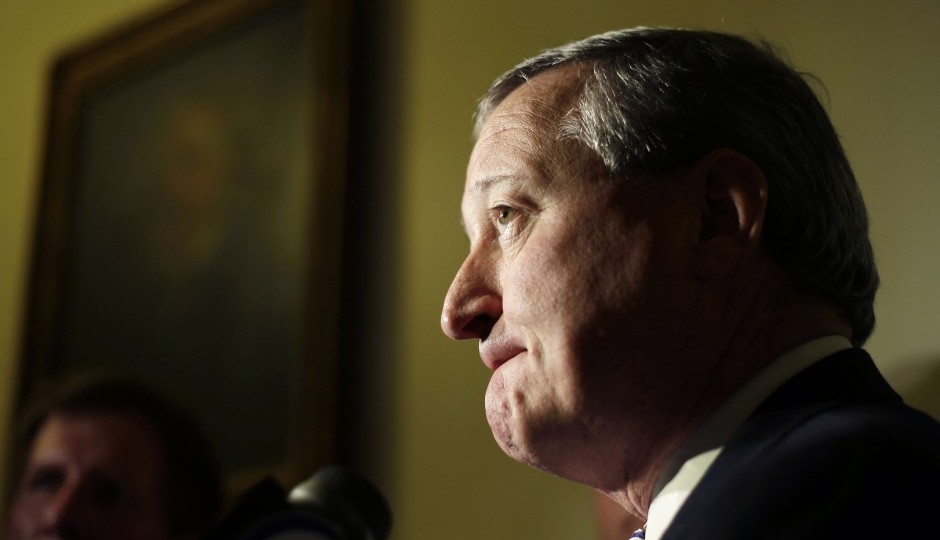Jim Kenney’s Complicated History with School Vouchers
The Philadelphia teachers union announced last month that it is backing former City Councilman Jim Kenney in the mayor’s race.
“His years of consistent support for traditional public schools and educators, and his vision for a better Philadelphia for every child make him the clear choice,” said Jerry Jordan, president of the Philadelphia Federation of Teachers.
Nearly 20 years ago, though, Kenney would likely have had a hard time wooing the PFT. In 1996, the young Democratic Councilman wanted to strike a deal with then-Republican Gov. Tom Ridge to obtain more funding for the city’s schools in exchange for something that is anathema to teachers unions: a voucher system, which would allow parents to use taxpayer dollars to pay for tuition at private and parochial schools.
Kenney sponsored a non-binding resolution that year calling on parents, local officials and Ridge to join together to “pursue funding solutions for the educational issues facing all of our children,” including “support for a pilot voucher program.”
A Daily News article explains, “The heart of Kenney’s argument was that it was time for a deal—give Ridge support for his pet project (vouchers) and secure more funding for Superintendent David Hornbeck‘s Children Achieving plan. Moreover, Kenney said a pilot voucher program would help parents who are struggling with the cost of sending children to parochial schools.”
Kenney’s resolution, which would not have impacted city policy, was defeated 10-7. Critics such as the late Councilwoman Augusta Clark argued then that vouchers would erode public school funding.
“You’re not going to reach into the meager coffers of the public school system,” said Clark at the time, “and, under guise of taking care of all the children and schools, reduce the amount of dollars available to public school children.”
Today, Kenney strongly opposes school vouchers, and his reasons for doing so would likely please Clark.
“As my style of clothing has changed since 1996, so has my evolution and understanding that vouchers are no longer a viable option,” he said in an interview with Citified.
Kenney believes a voucher system would divert money away from public schools and ultimately be infeasible.
So why did Kenney, now a darling of the city’s unions and progressives, want to experiment with vouchers in the first place? And could his record be a liability in the mayor’s race?
Kenney, a graduate of St. Joe’s Prep, said it was a different time in 1996: The parochial school system was larger and more affordable, but its future was uncertain. Charter schools, meanwhile, were just getting off the ground. Kenney said he “saw the handwriting on the wall” and thought a vouchers-for-state-funding deal with Ridge would aid public and parochial schools, while keeping charters at bay. Today, the city’s school system loses money for every student who leaves it for a new charter school, perhaps as much as $7,000 a head.
Kenney said in the 1990s state officials were debating a voucher worth roughly $500 per student annually, which he believes would have been enough money to only cover the tuition at parochial—and not other private—schools.
“Parochial schools in 1996 were probably about $300 to $400 a year per student,” he said. “Now if we had given a voucher to those parents, then those kids would have stayed in the parochial school and not gone to a charter school, which is where they’re going now, and the charter school cost is $7,000 a kid.”
Nelson Diaz‘s mayoral campaign has taken shots at Kenney for his record on vouchers, accusing his campaign of “hypocrisy” for criticizing a trio of pro-vouchers millionaires supporting state Sen. Anthony Williams for mayor. Williams, the state’s top pro-school choice Democrat, has sponsored voucher legislation in recent years.
“Jimmy-come-lately may have found religion on progressive issues late in his career,” said Diaz spokesman Barry Caro in a press release, “but he needs to account for what he once proudly called a ‘moderate conservative’ Council record that only ends curiously close to his decision to run for mayor.” Kenney did indeed once lament that Council liberals often blocked his “moderate-conservative” proposals like vouchers. But that was in 1996.
And Jordan, the teachers union president, is unfazed by Kenney’s past position on vouchers.
“That was 20 some years ago,” he said. “On the road to Damascus, like the apostle Paul, he has changed his opinion.”
Jordan also pointed out that education historian Diane Ravitch, a hero to many advocates for traditional public schools, supported vouchers and charters in past years. Today, she is a vocal critic of both policies.
Kenney, for his part, said, “Despite what Nelson Diaz claims, I was trying to help the public schools at the time.”
